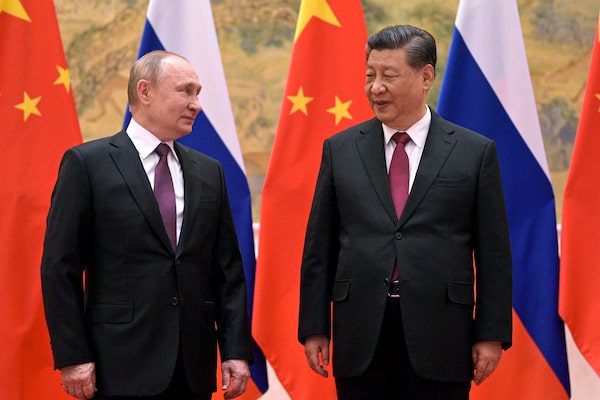
Chinese President Xi Jinping, right, and Russian President Vladimir Putin speak during their meeting in Beijing, Friday, Feb. 4, 2022.Alexei Druzhinin/The Associated Press
Chinese Foreign Minister Wang Yi spoke with his Ukrainian counterpart Tuesday, offering to play a role in ending the conflict between Russia and Ukraine as Beijing faces international criticism for appearing to stand by Moscow after the start of the invasion.
Mr. Wang said that the situation in Ukraine “has changed dramatically,” according to state broadcaster CCTV.
“China deplores the outbreak of conflict between Ukraine and Russia, and is extremely concerned about the harm to civilians,” he said. “China’s basic position on the Ukraine issue is open, transparent and consistent.
“We have always advocated respect for the sovereignty and territorial integrity of all countries. In response to the current crisis, China calls on Ukraine and Russia to find a solution to the problem through negotiations and support all constructive international efforts conducive to a political settlement.”
Ukraine said Foreign Minister Dmytro Kuleba had pushed Mr. Wang to press Russia to stop the war. The Chinese readout said Kyiv “is willing to strengthen communication with China and looks forward to China’s mediation to achieve a ceasefire.”
Beijing previously called for a diplomatic end to the conflict but stopped short of criticizing Moscow, with foreign ministry officials even unwilling to call the operation launched by Russia an “invasion.” This, as well as a show of unity by President Xi Jinping and Russian leader Vladimir Putin in early February, had been seen by many as proof that the war had China’s tacit approval.
In the call Tuesday, Mr. Wang noted “China has always believed that the security of one country cannot be achieved at the expense of the security of other countries, and regional security cannot be achieved by expanding military blocs,” apparent references to Moscow’s fears of NATO expansion, which Mr. Xi and Mr. Putin criticized last month.
But despite a closeness to Russia, Beijing is a long-time opponent of intervention, and the disruption to European logistics caused by the war is already causing economic problems in China, as is the knock-on effect of new sanctions against Moscow. China is also one of the only countries with strong ties to Russia and Ukraine – Kyiv is a member of Mr. Xi’s signature Belt and Road Initiative – giving it a potentially unique role to play as an interlocutor.
Politicians in the U.S. and Europe have criticized China for not doing more to prevent the conflict before it began.
According to The New York Times, U.S. officials repeatedly shared intelligence with China that showed an invasion was in the works, only for it to be ignored or even on one occasion shared with Moscow. Before Mr. Putin announced a “special military operation” on Feb. 24, sending troops and tanks across the border, officials in Beijing were openly dismissive of Western warnings, accusing Washington and the North Atlantic Treaty Organization of seeking to drive up tensions for their own purposes.
After China abstained from a vote at the United Nations denouncing Russia, British Foreign Minister Liz Truss criticized Beijing, saying “as a permanent member of the UN Security Council, we expect China to stand up for Ukraine’s sovereignty and territorial integrity.”
Speaking to The Globe and Mail ahead of Tuesday’s call, Wang Huiyao, an influential Beijing-based analyst and president of the Center for China and Globalization, said Beijing “wants to see this thing get resolved as soon as possible.”
“They’ve been very clear they don’t agree with this military confrontation, they want to de-escalate,” he said, adding the February statement released by Mr. Xi and Mr. Putin had been mistakenly seen as an endorsement of Russia’s later actions.
“If you really analyze word by word of that, there’s not really any encouragement or endorsement,” Dr. Wang said. “There is a shared concern about eastward expansion by NATO, but I think that’s a legitimate concern that has also been raised by some in the West.”
He said China could play a role in ending the conflict similar to what it has done in talks over Iran and North Korea, utilizing its relative strong ties to all parties and comparative neutrality.
“China does have a lot of influence it can use. Where on Earth can you find a third party who is on good terms with both Russia and Ukraine?” Dr. Wang said. “If we have Russia and Ukraine come to talk in Beijing, maybe they can solve things quickly.”
Our Morning Update and Evening Update newsletters are written by Globe editors, giving you a concise summary of the day’s most important headlines. Sign up today.
 James Griffiths
James Griffiths